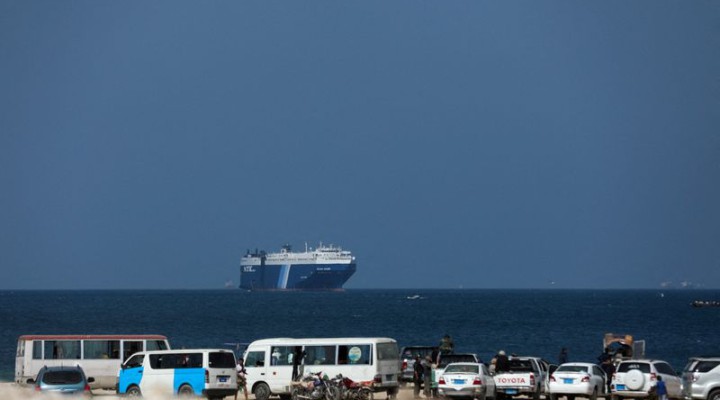Yemen and the war on Gaza

How will the US respond to the Houthi challenge to Israeli shipping?
By intercepting Israeli shipping and engaging US and French naval vessels in the Red Sea, Yemen’s Houthi Ansarullah movement has done more than embarrass the majority of Arab governments and armies that maintain a complicit silence about Israel’s assault on the Gaza Strip. Its bold act of solidarity may also hasten the defeat of that aggression and the end of the ban on humanitarian aid from reaching its inhabitants.
Ansarullah and its government in Sanaa have proven to be the staunchest supporters of the resistance in Gaza as it confronts the suffocating US/Israeli war of extermination against more than two million Palestinians. The movement is mounting a maritime blockade of Israel aimed at closing the Bab al-Mandeb Strait linking the Red Sea to the Arabian Sea to all Israeli shipping and all Israel-bound commercial vessels of whatever nationality.
The Yemenis are as good as their word. They are willing to go to war with the US in support of their brothers and sisters in Gaza. Palestine is a sacred cause for them, as shown by the massive demonstrations held in its support in virtually every Yemeni city.
Shortly after Ansarullah military spokesman Yahya Sarie went on TV to announce that all shipping heading for Israeli ports would be targeted, Yemeni forces attacked an Israel-bound oil tanker and launched three drones, which were brought down by a French frigate in the Red Sea.
The US administration has so far failed to react to the spate of attacks, either because it feels confounded or because it fears the consequences that could result from a retaliatory strike against Yemen or Ansarullah forces. It even urged Israel not to carry out its hollow threat to bomb Yemen in response to the detention of an Israeli-owned ship in the port of Hodeida.
Netanyahu officially asked US President Joe Biden and some European leaders to take the “necessary measures” to confront and break this Yemeni naval blockade of Israel. His national security advisor, Tzahi Hanegbi, threatened that Israel would act if the world did not deal with this matter.
The US’ hesitancy is due to its certain knowledge that any aggression against Yemen would immediately trigger drone and missile strikes against US military bases in Saudi Arabia the UAE, Qatar, and Bahrain, where thousands of its personnel are deployed.
Ansarullah’s reply to these threats was brief and to the point: “We are prepared for war. Go ahead.”
Ansarullah stood fast throughout the eight years of war on Yemen, despite the massive disparity in military power. It has tens if not hundreds of thousands of missiles, countless sea mines and fast-attack boats. Sarie’s words were not bluster but backed by a substantial tried and tested military capability.
Israel, coddled by the US and Europe, sees the Yemeni threat to its shipping as a siege, while it has been besieging the Gaza Strip for 17 years, denying its two million inhabitants the most basic of needs and even controlling the calories of the food they’re allowed: 2,000 per woman and 2,200 per man per day.
The Saudi authorities were right to advise Washington to show restraint and not react hastily when an Israeli-owned ship was impounded and taken to the Yemeni coast. They know that any military retaliation would be counterproductive. As well as unleashing attacks on US bases, it would shatter the ceasefire between Riyadh and Sanaa, plunging the region into chaos and instability, turning the Red Sea into a warzone, and causing a global energy crisis (four million barrels of oil bound for Western consumers transit Bab al-Mandeb every day).
The US is currently trying to get its clients in the region to do two things: put Ansarullah back on their ‘terrorist’ list; and a form a maritime protection force in the Red Sea and the Arabian Sea to confront any attempt to close the strait.
We don’t know whether it will achieve either of those goals. But we do know it would be blundering into what it has long warned against: the expansion of the war on Gaza into a regional war on multiple fronts — a war in which the US would be the biggest loser.
https://www.raialyoum.com/yemen-and-the-war-on-gaza/
 TheAltWorld
TheAltWorld 
0 thoughts on “Yemen and the war on Gaza”